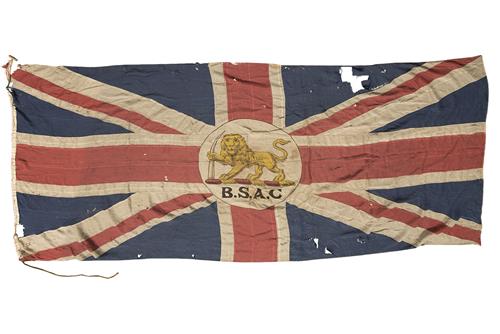Product Details
* A UNIQUE HISTORIC COLLECTION OF ARTIFACTS AND PERSONAL EFFECTS BELONGING TO CECIL RHODES
THE B.S.A.C. FLAG FROM RHODES FUNERARY CATAFALQUE,
specifically from his Lying in State in Bulawayo in April 1902 and used to drape the coffin, the design being a Union Jack with a central circular 'passant gardant' lion device grasping an elephant's tusk in its outstretched paw above 'B.S.A.C.' (the corporate trademark of the British South Africa Company), measuring 140in. x 68in. approximately, the edges in poor condition but the majority sound, suspension rope to the left hand side.
Provenance: This and the following six lots have all come by direct descent from the estate of Sir Thomas Smartt PC, KCMG, who was a long term friend of Rhodes in both business and personal life. Sir Thomas was given a number of personal effects of Rhodes after the funeral, all of which here have been submitted by the family.
A photograph of this flag in situ can be seen amongst a group of photographic plates illustrated in the rare volume 'The Late Right Honourable Cecil John Rhodes', subtitled 'Doctor of Civil Laws, Member of H.M. Privy Council, Member of the Legislative Assembly of Cape Colony' and 'A Chronicle of The Funeral Ceremonies From Muizenberg to the Matappos (sic), March-April 1902', a privately circulated publication by the Cape Times Ltd, 1905, a copy of which is included in the following lot.
Other Notes: Cecil John Rhodes PC (5 July 1853 – 26 March 1902) really requires no introduction. He was a British businessman, mining magnate and politician in Southern Africa who served as Prime Minister of the Cape Colony from 1890 to 1896. An ardent believer in British imperialism, Rhodes and his British South Africa Company founded the Southern African territory of Rhodesia (now Zimbabwe and Zambia), which the company named after him in 1895. South Africa's Rhodes University is also named after him. Rhodes set up the provisions of the Rhodes Scholarship, which is still funded by his estate, and put much effort towards his vision of a Cape to Cairo Railway through British territory.
The son of a vicar, Rhodes grew up in Bishop's Stortford, Hertfordshire, but was a sickly child. He was sent to South Africa by his family when he was 17 years old in the hope that the climate might improve his health. He entered the diamond trade at Kimberley in 1871, when he was just 18, and over the next two decades gained near-complete domination of the world diamond market. The De Beers diamond company, formed by him in 1888, still retains its prominence into the 21st century. Rhodes political career started when he entered the Cape Parliament in 1880, becoming Prime Minister ten years later. After overseeing the formation of Rhodesia during the early 1890s, he was then forced to resign as Prime Minister in 1896 after the disastrous Jameson Raid, an unauthorised attack on Paul Kruger's South African Republic (or the Transvaal). After Rhodes's death in 1902 at the age of only 48, he was buried in the Matopos Hills in what is now Zimbabwe.
One of Rhodes's primary motivators in politics and business was his professed belief that the Anglo-Saxon race was, to quote his will, "the first race in the world". Under the reasoning that "the more of the world we inhabit the better it is for the human race", he advocated vigorous settler colonialism and ultimately a reformation of the British Empire so that each component would be self-governing and represented in a single parliament in London. Ambitions such as these, juxtaposed with his policies regarding the indigenous Africans in the Cape Colony, describing the country's native population as largely "in a state of barbarism", he advocated their governance as a "subject race", and was at the centre of moves to marginalise them politically, have led recent critics to characterise him as a white supremacist and "an architect of apartheid".
Historian Richard A. Mcfarlane has called Rhodes "as integral a participant in Southern African and British imperial history as George Washington or Abraham Lincoln are in their respective eras in United States history. Most histories of South Africa covering the last decades of the nineteenth century are contributions to the historiography of Cecil Rhodes." According to Mcfarlane, the aforementioned historiography "may be divided into two broad categories: chauvinistic approval or utter vilification". Paul Maylam identifies three perspectives: works that attempt to either venerate or debunk Rhodes, and "the intermediate view, according to which Rhodes is not straightforwardly assessed as either hero or villain".
* Please note this item is subject to 5% VAT on the hammer price.
Please click HERE to view Terms & Conditions.
Estimate £5,000-10,000 € 5,548-11,096



